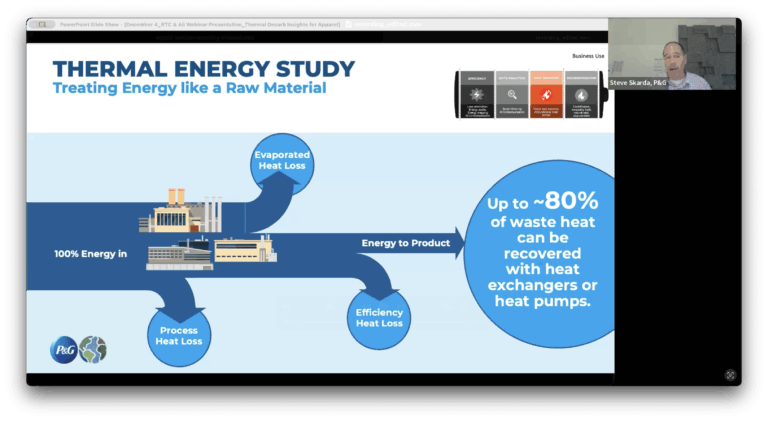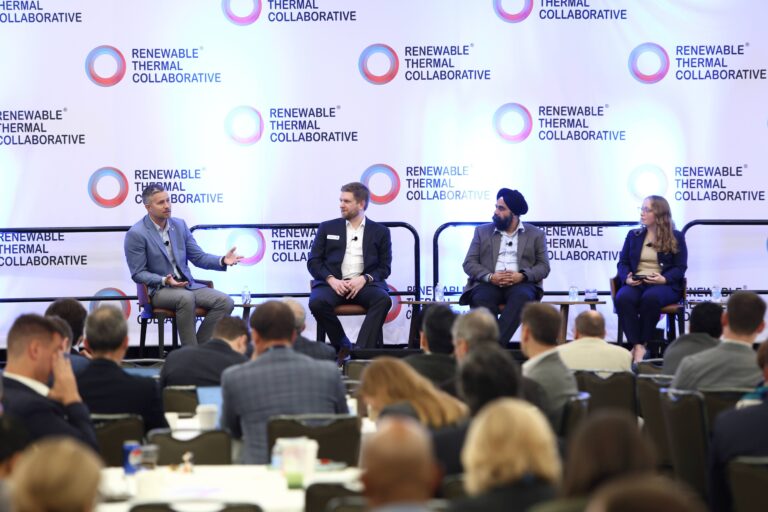For Immediate Release
April 14, 2025 2:00 pm ET
Renewable Thermal Collaborative’s Quarterly Update on Industrial Decarbonization
Energy Integration Inc., U.S. Energy, Vision RNG, and Zero Industrial Join the RTC in Q1 2025
Washington, D.C. – The Renewable Thermal Collaborative (RTC), the only global coalition focused exclusively on the decarbonization of thermal energy with renewable solutions, today shared its Quarterly Update on Industrial Decarbonization (QUID) for the first quarter of 2025. Highlights include: four new Solutions Providers joined the RTC, bringing the total number of participating companies to 109; the RTC released one case study and one new research publication; the RTC conducted three events; and three RTC Members and seven Solutions Providers announced new projects. These highlights represent some, but not all, of the progress being made towards the RTC objective of accelerating the pace of industrial decarbonization in the U.S. and around the world.
“The RTC continues to grow each quarter, because the need for business solutions for decarbonization continues to increase,” explained RTC Executive Director Blaine Collision. “As costs rise and manufacturers must meet the challenge of doing more with less, connecting innovative companies who need help from creative solutions providers becomes more valuable and relevant.”
Highlights of the first quarter of 2025 include the following:
1) Four New Solutions Providers
With the addition of the following companies last quarter, the RTC includes 50 Members and 59 Solutions Providers in the United States and around the world, totaling 109 participants. Members include global industrial and institutional energy buyers that represent more than $6.5 trillion in market capitalization across a range of industries, including chemical, food and beverage, consumer packaged goods, and pharmaceuticals. Solutions Providers provide relevant services for buyers and include equipment and engineering companies, advisors, developers, and others working to accelerate the renewable thermal market.
Energy Integration Inc. licenses Mechanical Vapor Recompression (MVR, or heat pump) technology that electrifies, decarbonizes, and reduces the energy required to operate industrial plants. It designs systems, assesses project feasibility, and licenses to the final system owner.
U.S. Energy is a vertically integrated energy solutions provider that builds tailored energy strategies from their portfolio of refined products, alternative fuels, and environmental credits.
Vision RNG provides solutions for capturing landfill emissions for conversion into a sustainable renewable product.
Zero Industrial is a developer of thermal energy storage projects in North America focused on decarbonizing industrial heat.
2) Two New Publications and Three Events
The Collaborative released one case study and one research publication, and convened three events in the first quarter of 2025.
Case Study: Solar Thermal at Birra Peroni Brewery: This case study details the partnership between Birra Peroni Brewery and RTC Solutions Provider Absolicon to deploy an innovative solar thermal system at Birra Peroni’s brewery in Bari, Italy. It examines the one-year pilot project’s operational performance and the importance of thermal storage in managing supply and demand variations.
Community Benefits Handbook: This handbook provides a comprehensive, practical guide to help organizations navigate the complex process of community collaboration and equity-focused project planning. This new RTC resource offers a step-by-step approach to community engagement that helps organizations build mutually beneficial community relationships that advance both organizational goals and local community well-being.
IHP Alliance Webinar: Industrial Heat Pump Economics in the United States: The Industrial Heat Pump Alliance held a webinar on January 16 exploring the economics of industrial heat pumps (IHPs) in the United States. The IHP Alliance, a partnership between the American Council for an Energy-Efficient Economy (ACEEE), the National Electrical Manufacturers Association (NEMA), and the RTC, seeks to leverage its collective knowledge, networks, and experience to accelerate the transition to a more sustainable and energy-efficient industrial sector.
LinkedIn Live: Community Benefits Handbook Release Preview: This livestream previewed the Community Benefits Handbook ahead of its release in January. Carlos Claussell of World Wildlife Fund, Trina Mallik of the RTC Community Benefits Advisory Board, and Yinka Bode-George of the Sustain Our Future Foundation discussed the context and purpose of the handbook.
Community Benefits Handbook Webinar: This in-depth webinar accompanied the publication of the RTC Community Benefits Handbook. It featured a presentation by RTC staff members and the main project consultants, Sustain Our Future Foundation and WSP, followed by a panel discussion with RTC Members and the RTC Community Benefits Advisory Board.
3) Ten New Member & Solutions Provider Projects
The RTC is the only place where large thermal energy users come together collaboratively with innovative solutions providers to understand the problems in the market, learn from each other, and overcome the barriers to renewable heating and cooling. Three RTC Members and seven RTC Solutions Providers announced new projects in the Fourth Quarter. To learn more about these announcements, visit the RTC LinkedIn page.
“We are continuing to see opportunities to help businesses succeed in the global marketplace by helping them to future-proof their manufacturing,” said Perry Hodgkins Jones, RTC Membership Director. “Given the changing dynamics of the global economy and the need for flexibility in adapting, membership in the RTC is now more beneficial than ever because our work is focused on helping our participants address, adapt, and advance.”
###
About the Renewable Thermal Collaborative
The Renewable Thermal Collaborative (RTC) is the global coalition of companies, institutions and
governments committed to decarbonizing their operations by scaling up renewable heating and cooling
technologies at their facilities. The RTC collaborates with its Members and Solutions Providers to
accelerate industrial decarbonization by addressing and identifying ways to overcome the technology,
policy, and market challenges that large thermal energy users face. Learn more at




